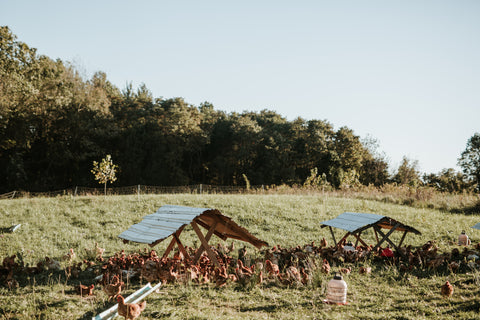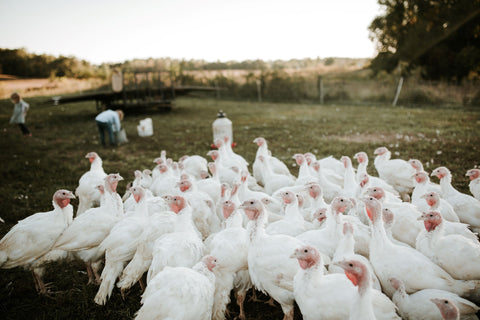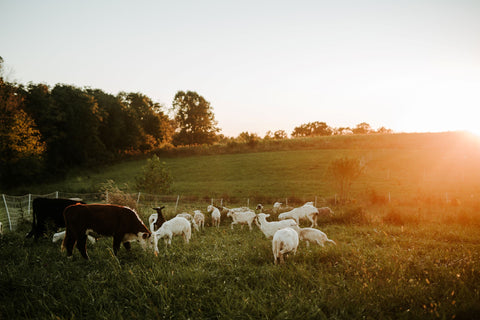How We Raise our Animals
For all concerned with human nutrition, flavor of food, land stewardship, best agricultural practices, clean air and water, and animal welfare: below is a detailed description of how we raise our products. Feel free to email us with any additional questions. We aim to stand behind what we do, and to bless all who eat our food, live in our watershed, and breathe air in our community. We try very hard to be a farm that is transparent and open. In short, you'll find that all our animals never get antibiotics, GMO's or chemicals. And they do get ample, frequently rotating pastures. The fact that their pastures rotate frequently is key to their diet and our land remaining healthy, vibrant, and able to produce amazing flavor and nutrient density for our customers now, and into the future.
Pork:
We occasionally breed young pigs. But typically we procure young, freshly weaned pigs (usually about six to ten weeks old) from local breeders with whom we have established relationships. The pigs we raise are usually heritage breed crosses of Duroc, Red Wattle, Old Spot, and a handful of other breeds. Once on our farm the pigs move directly into our forest, where they get access to fresh forest floor paddocks ever 1-2 weeks. The pigs begin with limited access to a non-GMO, unmedicated feed while they learn to forage, and then are allowed constant access to a ration later in life.
From the time our pigs are on the farm, they are raised behind electric wire. This enables us to move them frequently, efficiently, and in a way that can be adjusted to benefit animal and land welfare. Though it does cause temporary pain, it goes away quickly. Rest assured the farmer has experienced more shocks than any one pig on this farm (perhaps because they learn quicker than he does).
Our pigs spend about 90% of their lives in the woods, but do get access to some garden and pasture areas at strategic points in the year when it is beneficial for the land and pigs both. Throughout their lives the pigs on our farm will eat as many parts that they can of the following plant types: orchard grass, fescue, white clover, blackberry, honeysuckle, wild rose, buckwheat, sorghum, oat, barley, rye, pea, pumpkin, vetch, various annual weeds, oak trees (acorns), persimmons, hickory nuts, and more.
When butchering day comes, we attempt to load and unload pigs in a manner that is as un-stressful as possible. Patience and a good rapport with our animals go a long way in helping to make this happen.
We believe that placing pigs in rotating paddocks within their native ecosystem, with high quality rations, and a bounty of diverse forages is the best way to achieve a result that is not only great for human health and enjoyment, but also animal welfare and land stewardship.

Chicken, Duck, Turkey:
Our birds come to the farm direct from the hatchery as day old chicks, ducklings, or poults. Once on our farm, we provide our birds with a warm and safe environment in our brooder building. Here we can provide ample food and water in a fully sheltered environment. When old enough, we move all our birds to pasture. A typical chicken on our farm will spend the last 2/3 or more of its life in a rotating paddock with at least 45 square feet per bird. We believe the extra space and constant rotation is the key to our chicken being so full of flavor and nutrients. We have used many different breeds of chicken in the past, but have found that our open pasture-based system is more important than breed when it comes to animal well-being and the results we can taste in the product. So we have settled on Cornish Cross because of their efficiency in order to keep our product as affordable as possible. Though often maligned, the Cornish Cross chicken is not transgenically modified (GMO), and is not a Frankenbird or inhumane. When managed properly, they live good healthy lives enjoying pasture until we process them for their meat.

We raise pekin ducks and broad breasted turkeys. They are raised in a very similar fashion to the description above.

Beef:
We produce 100% grass-fed beef. Our cattle never get any antibiotics, GMO's, grain, or chemicals. They get a mineral supplement, forage (hay or pasture), and water. We raise calves born on our farm or on farms we trust with similar rearing practices, and we raise them to finish weight on our farm's pastures, or other land we rent in our community. Our meat CSA does buy in a portion of it's 100% grass fed beef from our partners, usually from our Amish neighbors who we know and trust.

Pork:
We occasionally breed young pigs. But typically we procure young, freshly weaned pigs (usually about six to ten weeks old) from local breeders with whom we have established relationships. The pigs we raise are usually heritage breed crosses of Duroc, Red Wattle, Old Spot, and a handful of other breeds. Once on our farm the pigs move directly into our forest, where they get access to fresh forest floor paddocks ever 1-2 weeks. The pigs begin with limited access to a non-GMO, unmedicated feed while they learn to forage, and then are allowed constant access to a ration later in life.
From the time our pigs are on the farm, they are raised behind electric wire. This enables us to move them frequently, efficiently, and in a way that can be adjusted to benefit animal and land welfare. Though it does cause temporary pain, it goes away quickly. Rest assured the farmer has experienced more shocks than any one pig on this farm (perhaps because they learn quicker than he does).
Our pigs spend about 90% of their lives in the woods, but do get access to some garden and pasture areas at strategic points in the year when it is beneficial for the land and pigs both. Throughout their lives the pigs on our farm will eat as many parts that they can of the following plant types: orchard grass, fescue, white clover, blackberry, honeysuckle, wild rose, buckwheat, sorghum, oat, barley, rye, pea, pumpkin, vetch, various annual weeds, oak trees (acorns), persimmons, hickory nuts, and more.
When butchering day comes, we attempt to load and unload pigs in a manner that is as un-stressful as possible. Patience and a good rapport with our animals go a long way in helping to make this happen.
We believe that placing pigs in rotating paddocks within their native ecosystem, with high quality rations, and a bounty of diverse forages is the best way to achieve a result that is not only great for human health and enjoyment, but also animal welfare and land stewardship.

Chicken, Duck, Turkey:
Our birds come to the farm direct from the hatchery as day old chicks, ducklings, or poults. Once on our farm, we provide our birds with a warm and safe environment in our brooder building. Here we can provide ample food and water in a fully sheltered environment. When old enough, we move all our birds to pasture. A typical chicken on our farm will spend the last 2/3 or more of its life in a rotating paddock with at least 45 square feet per bird. We believe the extra space and constant rotation is the key to our chicken being so full of flavor and nutrients. We have used many different breeds of chicken in the past, but have found that our open pasture-based system is more important than breed when it comes to animal well-being and the results we can taste in the product. So we have settled on Cornish Cross because of their efficiency in order to keep our product as affordable as possible. Though often maligned, the Cornish Cross chicken is not transgenically modified (GMO), and is not a Frankenbird or inhumane. When managed properly, they live good healthy lives enjoying pasture until we process them for their meat.

We raise pekin ducks and broad breasted turkeys. They are raised in a very similar fashion to the description above.

Beef:
We produce 100% grass-fed beef. Our cattle never get any antibiotics, GMO's, grain, or chemicals. They get a mineral supplement, forage (hay or pasture), and water. We raise calves born on our farm or on farms we trust with similar rearing practices, and we raise them to finish weight on our farm's pastures, or other land we rent in our community. Our meat CSA does buy in a portion of it's 100% grass fed beef from our partners, usually from our Amish neighbors who we know and trust.

